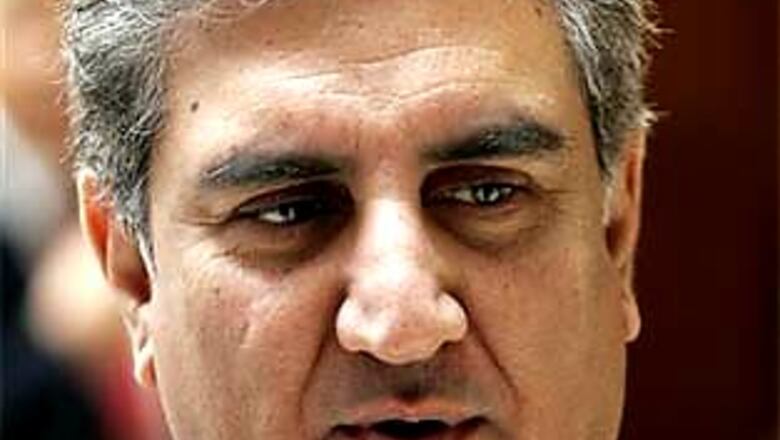
views
Islamabad: Pakistan and the United States share the common objective of defeating militancy but Pakistan will not be prodded into military operations by outsiders, Foreign Minister Shah Mehmood Qureshi said on Monday.
"We will not do anything, more or less, at the prodding of others. We will see what are Pakistan's requirements and priorities," Qureshi told reporters.
He was responding to a question about a New York Times report on Monday that said the United States had stepped up pressure on Pakistan to expand its fight against Taliban and al Qaeda militants.
The Pakistani army went on the offensive against the Pakistani Taliban in their South Waziristan bastion near the Afghan border last month, and the militants have retaliated with a surge of bomb attacks.
The United States, weighing options for how to turn around deteriorating security in Afghanistan, has welcomed the offensive but is also keen to see Pakistan tackle Afghan Taliban factions in lawless enclaves along the border.
US President Barack Obama is expected in the coming weeks to announce an overhauled strategy for Afghanistan that may include sending up to 40,000 more troops.
The United States has warned Pakistan the success of the strategy depends on Pakistan broadening its fight beyond the militants attacking it to groups using Pakistani havens for attacking against US troops in Afghanistan, the Times said.
It said Obama sent a letter to President Asif Ali Zardari saying he expected the Pakistani leader to rally political and national security institutions in a united campaign against extremists.
The newspaper said Obama's national security adviser, General James Jones, delivered the letter. Jones met with Pakistani government and military leaders on Friday in Islamabad.
Pakistani Foreign Ministry spokesman Abdul Basit confirmed Jones had delivered a letter but declined to give details. His minister, Shah Mehmood Qureshi, told reporters later that Pakistan and the United States shared the common objective of defeating the militants, but the government would decide on military operations in consultation with the armed forces.
In the letter, Obama offered a range of incentives to the Pakistanis for their cooperation, including enhanced intelligence sharing and military cooperation, the Times said.
The United States has made repeated calls for Pakistan to increase its efforts in the campaign against militancy since the September 11 attacks on the United States.
FACTIONS IGNORED
The calls have at times angered Pakistani officials, who say Pakistan has lost far more members of its security forces battling militants on its side of the border than the United States has in Afghanistan. But critics say while Pakistan has arrested hundreds of al Qaeda members, including several top leaders, and is now battling militants fighting the Pakistani state, Afghan Taliban factions have been largely ignored.
Obama said in China on Monday al Qaeda was the biggest threat to US security.
Pakistan nurtured the Taliban during the 1990s, partly as a bulwark against Indian influence in Afghanistan, but officially stopped supporting the Islamists after the September 11 attacks.
In the latest in a wave of attacks, a suicide car-bomber killed four people when police challenged him at a checkpost near an air force base close to the northwestern city of Peshawar.
The violence has rattled Pakistani stock market investors but the main index ended 2.62 per cent higher at 9,304.31 on hopes for an interest rate cut.
The army went on the offensive in South Waziristan on October 17 aiming to root out Pakistani Taliban militants who stepped up their war on security forces in 2007.
But for the time being at least, allied Afghan Taliban factions operating out of semi-autonomous Pashtun lands on the border are being left alone.
Analysts say with both the United States and Afghanistan raising the possibility of talks with the Taliban, Pakistan is unlikely to fight factions that might soon be part of a negotiated Afghan settlement.
The time Obama is taking to decide on more troops for Afghanistan, with some advisers and many in his own Democratic Party expressing concern about a big increase, has reinforced the view Washington may seek a deal rather than try to crush the Taliban militarily.
The Pakistan army has declined to comment on what it will do in its campaign against the militants after South Waziristan.

















Comments
0 comment